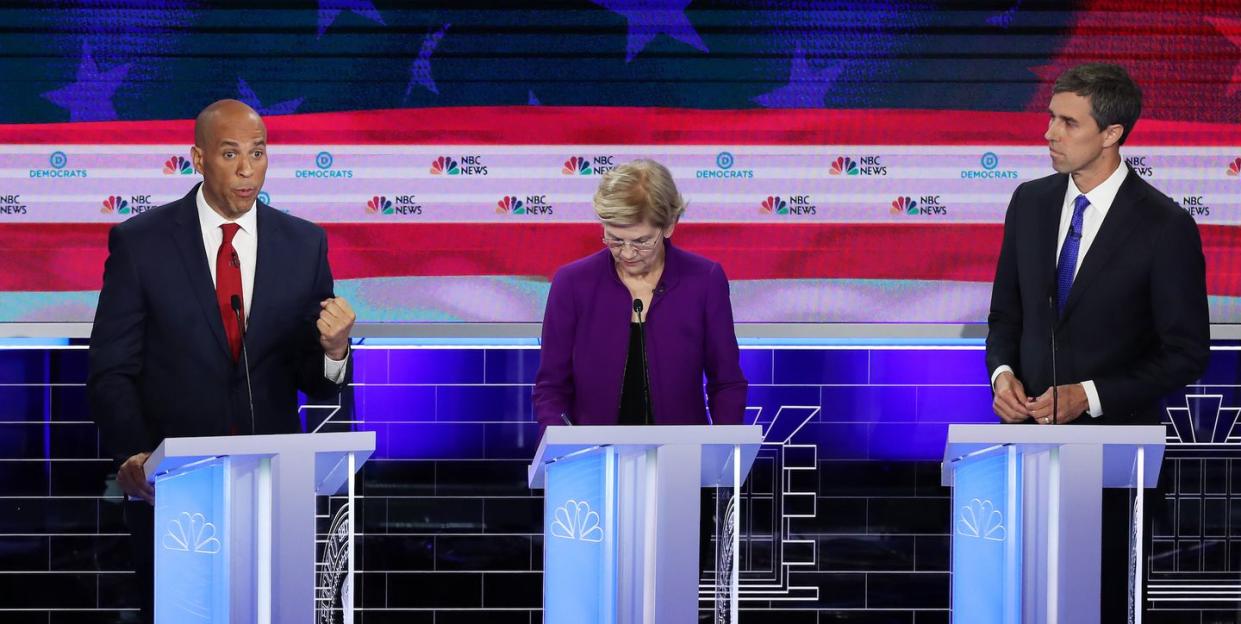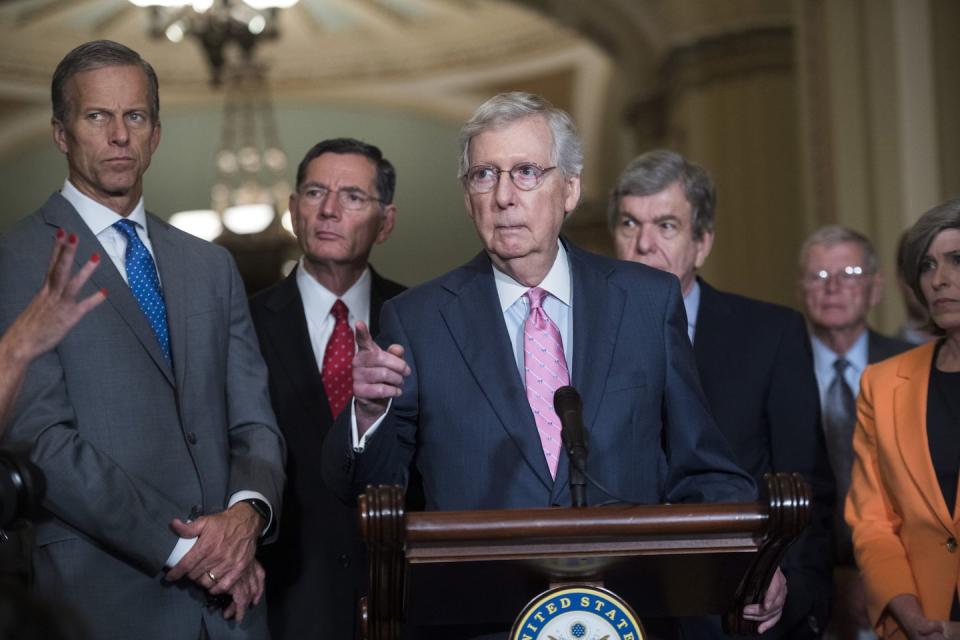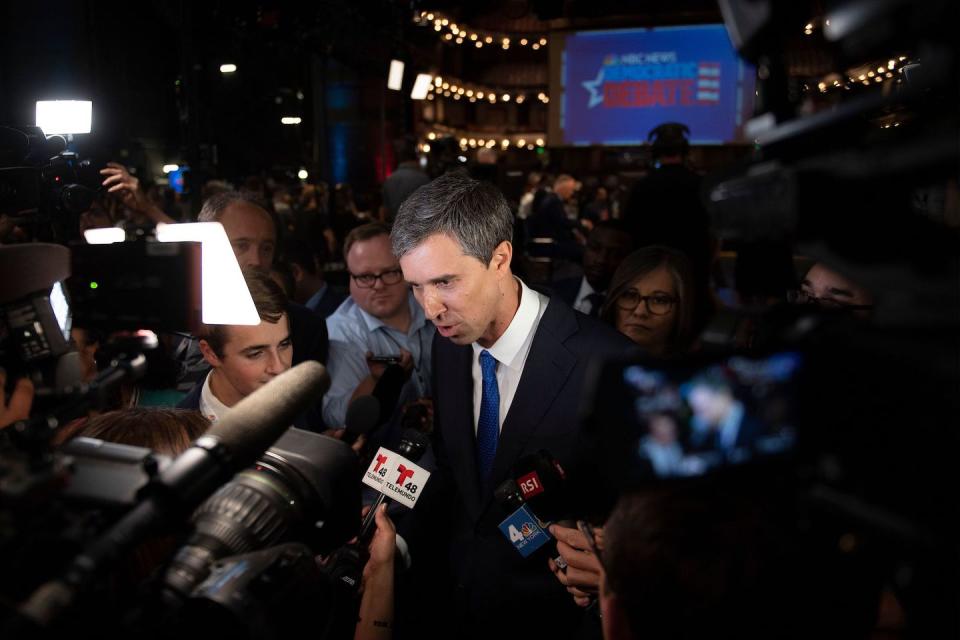No Democrat on That Stage Had an Answer for Mitch McConnell

Julián Castro broke through on a number of occasions with real moral clarity-and expertise-on immigration. Elizabeth Warren spoke with the authority of a candidate surging in the polls because she has wound all of her plans up into a cohesive philosophy of how the money power in our politics must be challenged with courage and tenacity. Cory Booker had his moments, and Jay Inslee had a few fewer.
The oft-mocked Bill de Blasio brought some New York political belligerence from stage right, and repeatedly tried to center the discussion on how Democrats must be the party of working people again. He had a far better night than the guy on the other end of the stage, John Delaney, who devoted most of his time to suggesting everyone else's ideas were pipe dreams and Democrats should settle in for some Earned Income Tax Credits. He should really find a new hobby, like so many other candidates in this field.
But more than anything, it was genuinely disorienting after the last three years to witness a political event where people discussed the appeal of Medicare For All versus a public option, rather than how big someone's hands were or whether other people on stage should be thrown in jail. But much as he was the last guy invited to the party only to insist on DJing, Delaney had a point in one respect: while the more ambitious progressive ideas on stage were not unrealistic on the merits, they are unrealistic as long as Mitch McConnell controls which bills get a vote in the Senate. Health coverage expansion, a Green New Deal, humane immigration reform, a wealth tax to fund universal childcare and universal pre-K-all these plans are D.O.A. if Republicans hold onto 50 seats in the Senate.
To his credit, Chuck Todd-who, thanks in part to a technical catastrophe that surely kicked off an all-time screaming match in the control room, spoke more words at this event than all but three candidates-asked about the McConnephant in the room. Here's Warren's response:
Question: "Do you have a plan to deal with Mitch McConnell?"
Sen. Elizabeth Warren: "I do." https://t.co/1F6AIZyNSv #DemDebate pic.twitter.com/rTSk5Uyt9G- CNN (@CNN) June 27, 2019
This isn't really an answer. The Death of Shame in our politics means political pressure just doesn't pay anymore, however much it ever did. Republicans rely on an entirely separate ecosystem of media and information to interact with the voters whose support they need, and pressure from outside that bubble is rarely effective. The party's attempts to destroy the Affordable Care Act were defeated with massive resistance, but is that really going to be the norm? And would that work in a positive or proactive sense, when Democrats are trying to get a new bill through rather than just defeat one? Right now, House Democrats have passed a number of bills-including H.R. 1, an absolute no-brainer voting rights and anti-corruption package-that have just passed over into the ether, never to get a hearing in McConnell's Senate.
The Kentucky senator helped usher in this era of obstructionism and power politics with his flagrant attacks on the institutions of our democracy, maximizing the undemocratic features of the chamber he controls. The Senate has essentially been converted into a judge-confirmation machine for the current Republican president, as McConnell has largely abandoned the body's legislative functions with the exception of funding bills and a modest criminal-justice reform measure and the Give Corporations and the Rich Some More Money Act.

He attempted to strip the last Democratic president of his ability to nominate federal judges, as Senate Republicans blocked more of Barack Obama's nominees with the filibuster than all previous presidents combined. McConnell blocked the Supreme Court nomination of Merrick Garland, citing a made-up "Biden Rule" about nominating justices in an election year, but now says he'd put a Trump nominee up for a vote in 2020-an election year. All this is to say that McConnell has no regard for the political blowback or the shame hurled at him by opponents. The most cynical man in Washington has the cold calculus of the megalomaniac, and he won't put a Green New Deal bill on the floor because he got some phone calls.
Here's how other candidates grappled with The McConnell Question.
BOOKER: When it comes to the Supreme Court, very clearly, we-I agree with my friend, Secretary Castro. We are going to get to 50 votes in the Senate. This is a team sport. Whoever is our nominee needs to campaign in places like South Carolina, because we can elect Jamie Harrison. They need to campaign in places like Iowa, because we can win a Senate seat there.
This is about getting us back to having 50 votes in the Senate and more so that we cannot only balance the Supreme Court, but start to pass an aggressive agenda that, frankly, isn't so aggressive, because most of America agrees with the policy objectives of our party.
This sounds good, but Democrats have been slow to even put up candidates in a lot of Senate races. South Carolina is a long-shot, but there are some red seats Democrats could compete for: Colorado, Maine, Arizona, North Carolina, Iowa, Montana, Georgia, Texas, and, if Republicans re-nominate Roy Moore, Alabama. In many of these cases, Democrats running probably-doomed presidential bids could have stepped up. John Hickenlooper, the popular governor of Colorado, could have tried to take Cory Gardner's Senate seat. Beto O'Rourke, whom Castro set out to destroy last night with some success, could have battled John Cornyn in Texas. Steve Bullock, the governor of Montana, could have taken on Steve Daines in that state.

At the end of the day, Democrats will probably lose Alabama, and will need to gain at least four seats and the White House to retake control. Do they look like they're doing that? And who's running against McConnell himself, who's up for re-election in Kentucky?
DE BLASIO: But to your question about Mitch McConnell, there is a political solution that we have to come to grips with. If the Democratic Party would stop acting like the party of the elites and be the party of working people again, and go into states, including red states, to convince people we're on their side, we can put pressure on their senators to actually have to vote for the nominees that are put forward...
Again, this sounds good, but who is doing it? Who will do it in time to change the course in 2020 and preventing all these ambitious proposals from being rendered moot? Where is the Democratic Party leadership, who ought to have recruited viable candidates for most or all of these races by now? Perhaps the number one failing of the Obama years was the complete capitulation on down-ballot races, as the then-president's operation took precedence over a sprawling Democratic machine. The result was 900 state legislature seats lost, and a hollowing out of the party's influence in state governments. But this isn't even a state assembly we're talking about. It's the United States Senate, and while Mitch McConnell controls it, nothing else matters.
('You Might Also Like',)

